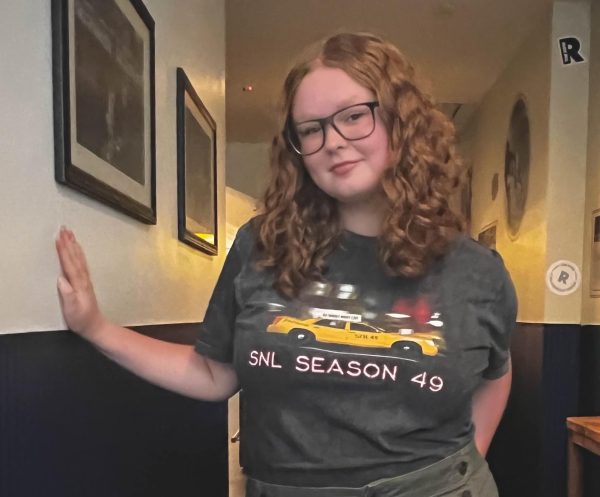15 to life: Kenneth’s story
November 19, 2014
“Everything happened so fast. One day, I’m 15 years old I’m in society then-next I’m out. You telling me that I’m gonna never go home?” The film begins with Kenneth Young, a prisoner with four consecutive life sentences saying this. The Beyond Boundaries: Dare to be Diverse series came to an end for the fall semester with “15 to Life: Kenneth’s Story” on Nov. 13.
Made by filmmaker Nadine Paquenza, the documentary is based on the topic of children receiving life sentences. At the age of 15, Young committed four armed robberies causing him his sentences. The film follows a resentencing after 10 years in confinement, that could possibly release him earlier. With Supreme Court revisions ruling that life sentences for juveniles convicted of crimes other than murder were unconstitutional. Young will have to battle in a Florida court, historically known for incarcerating children.
During the screening, the film traveled through Young’s childhood. His mom, a crack addict, his sister, pregnant at the age of 15 and himself, who dropping out of school at 11 to watch his sister’s baby. Early on, it was clear that his violent neighborhood and problematic home heavily influenced his actions. Jacques Bethea, Kenneth’s leader in the crimes and Kenneth’s mother’s crack dealer also played a huge part in the robberies, known as more so violent and vocal than Kenneth and supposedly threatened Young’s life if he did not assist in the crimes. Paolo Anino and Corrine Koeppen are the lawyers that advocate Young’s release. They present him in court as a rehabilitated and mature man now that he is 26 years old.
Meg Knowles, a communication professor here at SUNY Buffalo State, who is curating the film along with Ruth Goldman, shared her incite and purpose for showing the film.
“We’re trying to bring fresh views to the campus… and bring different themes forward about different areas of diversity,” Knowles said.
Knowles and Goldman, who is also a professor in the communication department, are documentary filmmakers themselves and empathize with the power of a documentary like “15 to Life” can have, especially for young people.
“He has no opportunity to redeem himself,” Knowles said.
One viewer from a previous screening, shared with Knowles that she felt such a purpose to influence change. Knowles is optimistic about the future for the documentary series, and also disclosed that she is very excited for next semester, especially now that they have received some funding for screenings similar to “15 to life.” Ultimately, their purpose of sharing these issues has been effective.
“We want to start a conversation,” Knowles said.
Unfortunately, the decision did not land in Young’s favor, which gave him 30 years in prison. With his, his mother’s and the victim’s testimony all shared in the court, it brought mixed reactions from the crowd. During his testimony, he shares a bible verse that gives key incite into his perspective of his actions.
“First Corinthians, Chapter 13, Verse 11 says: ‘When I was a child I thought as a child. When I became a man I put away all childish things.’ I want to turn around and apologize to my victim for what I did.” Though he will be incarcerated for 30 years, he seemed positive about the future and the possibility of parole.
Young’s story was brutal to many people in the audience and reflects the issues in the criminal justice system. The United States is the only country in the world that sends children to life in prison and has sent 2,500 children to life without parole since the early 1990’s. 70 percent of those crimes by juveniles is under the direction of an adult. With that said, the U.S Supreme Court has saved some children, but couldn’t save Young.
After the film, followed a panel discussion. The discussion was led by Ron Stewart, a sociology professor at Buffalo State and joined with Teresa Miller, a professor at the University of Buffalo Law School, who also is an advisor to the Lifer’s Group at Attica State Prison and vice provost of equity and diversity at UB. Umar Adeyola, the founder & president of H.E.A.R.T. (Helping Empower At-Risk Teens); and Craig D. Hannah a City Court Judge in Buffalo joined the panel. All of them had a different perspective about the serious issue with Kenneth Young’s resentencing.
All shared that Kenneth Young being a black man was a key factor in his lengthy imprisonment. Stewart, also showed the fact that there seemed to be a stagnant reaction from the judge. He suspected that the judge could have been spiteful based on the fact that the Federal court forced Young’s case to be reviewed and resentenced which caused such a verdict.
“He made his decision when he walked through the door,” said Stewart when asked by Hannah when did Stewart think the judge made his decision.
Miller also suggested that the problem could be what people think of as “criminals.” She shared that most times, women and children are accomplices to men, and are often given longer sentences then men.
She also notes that it is a common injustice in the system. Adeyola, who has experienced extensive time in jail, expresses the fact that no one wants to give Young a second chance. It hit home for him because he is a product of a troubled past, but eventually made a life for himself. Hannah also shared that Young’s major mistake was dropping out of school.
“Lack of education is a direct pipeline into the Criminal Justice System,” Hannah said. “I would have been just like Young if I didn’t go to school.” All of the members of the panel shared that the message of the film deeply resonated with them.
During the discussion, a few questions were asked and one child at a tender age, appearing to be eight or nine, asked that if it is true that many black kids go to jail or is it just because of the large black population. Stewart answered expressing that densely populated minority areas are policed more, no matter the socio-economic status. Stewart also shared that when police watch, there is a better chance that they will find more unlawful activities. Another expressed her realization that electing judges is a very important factor in changing the criminal justice system. The audience had very strong opinions throughout and every viewer was left with some provoking thoughts about Young.



